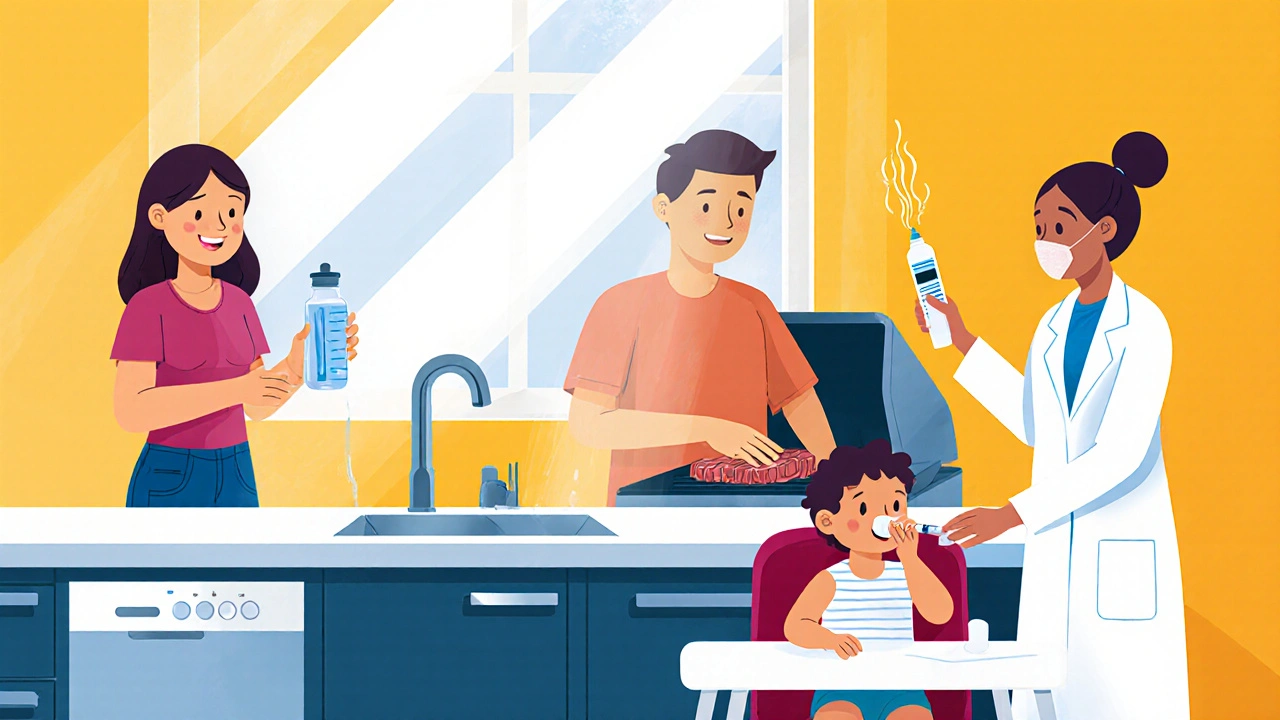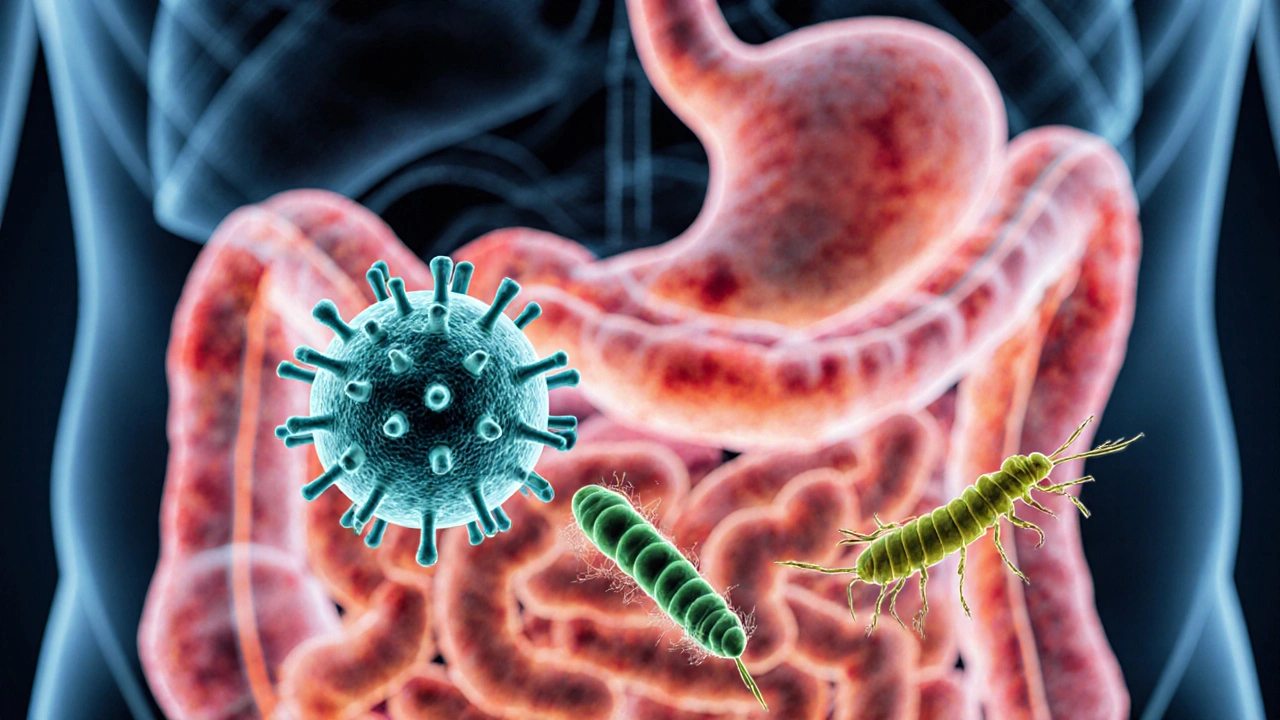ORS Calculator for Gastroenteritis
Oral Rehydration Solution Calculator
Enter your age and weight to get personalized ORS instructions.
gastroenteritis is a common stomach and intestinal infection that can strike anyone, but knowing what triggers it, how it shows up, and the best ways to treat it can keep you from spending days in bed.
What Is Gastroenteritis?
When you hear the term Gastroenteritis is an inflammation of the stomach and intestines, usually caused by an infection, think of it as the body’s reaction to germs that irritate the digestive tract. The irritation leads to rapid loss of fluids and electrolytes, which is why staying hydrated is the first priority.
How It Starts: Main Causes
Most cases boil down to three culprits: viruses, bacteria, and parasites. Below is a quick look at the most frequent offenders.
| Cause Type | Common Pathogen | Typical Transmission | Onset Speed |
|---|---|---|---|
| Viral | Norovirus | Contaminated food, water, or surfaces | 12-48 hours |
| Bacterial | Escherichia coli (E. coli) | Undercooked meat, unpasteurized dairy | 2-5 days |
| Parasitic | Giardia lamblia | Contaminated water sources | 1-2 weeks |
Viral agents like Norovirus are the leading cause in schools and cruise ships, while E. coli often appears after eating raw or undercooked beef. Parasites such as Giardia are less common in the U.S. but still a risk when hikers drink untreated stream water.
Spotting the Symptoms
Typical signs show up within a day or two and can include:
- Watery diarrhea (often 3-8 times a day)
- Vomiting or nausea
- Abdominal cramps and pressure
- Low‑grade fever (usually under 101°F/38.3°C)
- Headache and muscle aches
If diarrhea is bloody, lasts more than a week, or is paired with severe dehydration, it’s time to call a doctor.

Why Dehydration Happens and How to Counter It
Rapid fluid loss leads to Dehydration. Even mild dehydration can cause dizziness, dry mouth, and reduced urine output. The gold‑standard remedy is Oral Rehydration Solution (ORS), a balanced mix of water, salts, and glucose that restores electrolytes faster than plain water.
Homemade ORS can be made by mixing 1 liter of clean water with 6 teaspoons of sugar and half a teaspoon of salt. For children, use half the volume and adjust sugar/salt accordingly.
Treatment Options: From Home Care to Prescription
Most cases resolve without medication, but supportive care speeds recovery.
- Hydration: Sip ORS, clear broths, or electrolyte drinks throughout the day.
- Diet: Follow the BRAT diet (Bananas, Rice, Applesauce, Toast) for the first 24‑48hours, then gradually add bland proteins.
- Rest: Give your immune system a break; avoid strenuous activity.
- Medications:
- Anti‑diarrheal agents (e.g., loperamide) may help adults with mild symptoms, but avoid if you have a fever or bloody stools.
- For bacterial infections like E. coli O157:H7, antibiotics are generally NOT recommended because they can increase toxin release. However, certain bacterial strains (e.g., Campylobacter) do respond to a short course of Antibiotics.
- Probiotics (Probiotics) such as Lactobacillus rhamnosus GG have shown modest benefit in shortening diarrhea duration.
Always consult a healthcare provider before starting any medication, especially for children, pregnant people, or those with chronic illnesses.
When to Seek Professional Care
Most healthy adults recover in 3‑5days. Seek medical help if you experience any of the following:
- Signs of severe dehydration (dry skin, rapid heartbeat, little or no urine)
- Persistent high fever (>102°F/38.9°C) lasting more than 24hours
- Bloody or black stools
- Diarrhea lasting more than a week
- Severe abdominal pain that doesn’t ease
- Symptoms in infants, elderly, or immunocompromised individuals

Prevention: Keeping Gastroenteritis at Bay
Reducing exposure is easier than treating an outbreak. Key habits include:
- Wash hands with soap for at least 20 seconds, especially after using the toilet and before eating.
- Cook meats to proper internal temperatures (e.g., 160°F/71°C for ground beef).
- Avoid unpasteurized dairy and raw shellfish.
- Use bottled or filtered water when traveling to regions with questionable sanitation.
- Consider vaccination: a Rotavirus vaccine is recommended for infants and has dramatically cut severe cases worldwide.
Key Takeaways
- Gastroenteritis is an infection‑driven inflammation of the gut, most often caused by viruses like Norovirus or bacteria such as E. coli.
- Watch for watery diarrhea, vomiting, cramps, and mild fever; seek care if symptoms are severe or prolonged.
- Rehydration-preferably with ORS-is the cornerstone of treatment.
- Antibiotics are only for specific bacterial strains; probiotics and anti‑diarrheal drugs can help symptomatically.
- Good hygiene, proper food handling, and vaccines are the best defenses.
Frequently Asked Questions
Can I catch gastroenteritis from a person who is already sick?
Yes. Viruses like Norovirus spread easily through close contact, contaminated surfaces, and shared food. Hand washing and surface disinfection are vital.
Is it safe for children to take over‑the‑counter anti‑diarrheal meds?
Generally no. Children under 12 should avoid loperamide because it can slow the removal of the pathogen. Focus on hydration and a bland diet instead.
How long does a typical viral gastroenteritis episode last?
Most viral cases resolve within 3‑5days, with symptoms peaking around day 2. Full energy may take a few extra days to return.
Can probiotics prevent future bouts of gastroenteritis?
Probiotics help maintain a healthy gut flora, which can lessen severity, but they aren’t a guaranteed shield against infection.
When is a rotavirus vaccine needed?
The rotavirus vaccine is given to infants in a series of two or three doses starting at 2 months of age. It’s part of the routine pediatric schedule in many countries.

Comments (20)
Odin Zifer
October 12, 2025 AT 18:05
Water from the tap is poisoned by a secret agenda.
Marisa Leighton
October 15, 2025 AT 01:38
Great job on breaking down the basics of gastroenteritis!
Your explanation of the ORS calculator is spot on and super helpful for anyone dealing with dehydration.
I love how you emphasized the importance of staying hydrated, especially for kids and the elderly.
Did you know that homemade ORS can be made with just sugar, salt, and clean water?
That little tip can save lives in low‑resource settings.
Also, the reminder to avoid anti‑diarrheal meds in young children is crucial.
Parents often think a little loperamide will help, but it can actually trap the pathogen inside.
Your list of warning signs is clear and easy to remember.
If someone experiences bloody stools or a fever over 102°F for more than a day, they should definitely see a doctor.
The prevention section is a goldmine of practical advice.
Washing hands for at least 20 seconds might sound boring, but it’s the most effective barrier we have.
Cooking meat to proper internal temperatures isn’t just a chef’s rule-it’s a health rule.
And let’s not forget the rotavirus vaccine, which has dramatically cut severe cases worldwide.
Your FAQs address the most common worries, like how long a viral bout lasts and whether probiotics can prevent future episodes.
Overall, this guide is thorough, user‑friendly, and life‑saving-thank you for sharing it!
Chelsea Hackbarth
October 17, 2025 AT 09:11
Well‑done! This guide covers the essentials and even throws in an ORS calculator 🎉. The dehydration tips are spot‑on, especially the part about oral rehydration salts 😊. If you’re ever in a pinch, remember the 1‑liter water, 6‑teaspoon sugar, and half‑teaspoon salt recipe. Keep it handy and you’ll be a hydration hero! 🚰
Adam Shooter
October 19, 2025 AT 16:45
The exposition employs a laudable synthesis of pathophysiological mechanisms, yet it could benefit from a more granular stratification of etiological agents. Incorporating phylogenetic delineation of norovirus genogroups would augment the scholarly rigor. Moreover, the therapeutic algorithm omits consideration of electrolyte perturbations beyond sodium‑potassium homeostasis, which is a nontrivial oversight. In summation, the piece is competent but warrants a deeper dive into molecular epidemiology.
Shanmughasundhar Sengeni
October 22, 2025 AT 00:18
Look, the article is fine but it’s missing the real talk – you can’t just slap a generic ORS recipe on every case. Kids need different concentrations, and the elderly have comorbidities that change everything. Still, nice effort, just add those specifics next time.
Christina Burkhardt
October 24, 2025 AT 07:51
Thanks for the thorough rundown! It’s great to see practical steps laid out clearly. 👍 If anyone’s unsure about the ORS mix, feel free to ask – happy to help.
liam martin
October 26, 2025 AT 14:25
Ah, the noble quest for hydration amidst chaos – a timeless drama of the human condition. One must sip the elixir, lest the abyss of dehydration consume the spirit.
Ria Ayu
October 28, 2025 AT 21:58
I really appreciate the gentle tone of this guide. It makes a scary topic feel approachable. Keep spreading such kindness!
maya steele
October 31, 2025 AT 05:31
Thank you for the comprehensive overview. The structure is logically ordered, and the language is precise. This will serve as a valuable reference for clinicians and laypersons alike.
Sharon Lax
November 2, 2025 AT 13:05
While the article is informative, its reliance on generic statements undermines its utility. A more data‑driven approach would elevate its credibility.
paulette pyla
November 4, 2025 AT 20:38
Oh sure, another “expert” telling us to wash hands. As if the government hasn’t been forcing that on us forever. 🙄
Benjamin Cook
November 7, 2025 AT 04:11
Wow!!! This is so helpful!!!! I love how clear everything is!!!!
Seriously, the ORS calculator is a game‑changer!!!!
Don’t forget to double‑check your measurements – typo‑prone folks like me can mess up!!!!
Stay hydrated and stay awesome!!!!
karthik rao
November 9, 2025 AT 11:45
While the guide is generally accurate, one should not overlook the nuance that viral gastroenteritis rarely benefits from antibiotics – a point often misunderstood. Moreover, the suggestion to use ORS without proper water quality verification can be hazardous in regions with contaminated supplies. 😉
Breanne McNitt
November 11, 2025 AT 19:18
Great summary, thanks for sharing! I think we can all agree it’s a solid start.
Ashika Amirta varsha Balasubramanian
November 14, 2025 AT 02:51
This guide beautifully bridges science and everyday practice, emphasizing community health. Your culturally sensitive recommendations, especially regarding water safety abroad, are commendable. Let’s continue to disseminate such knowledge across borders.
Rebecca Bissett
November 16, 2025 AT 10:25
Wow-what an emotional rollercoaster!!! This article pulls at every heartstring!!! It’s as if the very essence of human vulnerability is laid bare!!!
Shanmugapriya Viswanathan
November 18, 2025 AT 17:58
Obviously, the best way to prevent gastroenteritis is to follow strict national guidelines – everyone knows that! 👍
Rhonda Ackley
November 21, 2025 AT 01:31
Let me take a moment to unravel the tapestry of gastrointestinal turmoil that we simply call gastroenteritis.
First, we must acknowledge the insidious nature of viral agents, those microscopic marauders that hijack our intestinal epithelium.
Then, there is the bacterial faction, each species brandishing its own virulence arsenal-think of E. coli’s shiga toxin as a molecular dagger.
The clinical tableau presents itself with watery diarrhea, nausea, and sometimes a fever that flirts with the threshold of concern.
Yet, the cornerstone of therapy remains humble, primal even: rehydration.
Oral Rehydration Solutions, those simple concoctions of glucose and electrolytes, are the unsung heroes that restore osmotic balance.
In severe cases, intravenous fluids ascend to the stage, delivering isotonic salvation directly into the circulatory highway.
Antibiotics, contrary to popular belief, are reserved for the bacterial culprits, never for a robin‑red‑breasted virus.
Probiotics-those friendly bacteria-may aid in hastening recovery, but they do not constitute a shield against infection.
We must not forget the preventative choreography: rigorous hand hygiene, meticulous food preparation, and prudent water consumption.
A 20‑second hand wash might seem trivial, yet it is a barrier that halts the spread of pathogens with elegant efficiency.
Cooking meats to their recommended internal temperatures is a gastronomic safeguard that eliminates lurking bacteria.
Avoiding unpasteurized dairy and raw shellfish further diminishes exposure risks.
Vaccination, particularly the rotavirus series for infants, has dramatically curtailed severe disease burdens worldwide, a triumph of modern medicine.
When symptoms persist beyond a week, when stools turn bloody, or when a fever soars beyond 102°F, the situation escalates to medical urgency.
In such moments, the clinical gaze must pivot toward diagnostic testing to pinpoint the exact offender.
Finally, as we navigate the recovery phase, a bland diet-think bananas, rice, applesauce, toast-offers gentle nourishment while the gut mends its delicate lining.
Thus, through a blend of vigilant prevention, judicious rehydration, and targeted therapy, we can tame the tempest that is gastroenteritis.
Sönke Peters
November 23, 2025 AT 09:05
Solid post – the info is clear and useful.
Carissa Engle
November 25, 2025 AT 16:38
This article attempts to cover the spectrum of gastroenteritis but falls short in several key areas the lack of quantitative data on incidence rates is glaring the reliance on generic advice without contextual risk stratification limits its practical application furthermore the omission of recent meta‑analyses on probiotic efficacy leaves a notable gap for informed decision‑making a more rigorous approach, incorporating statistical outcomes and evidence‑based guidelines, would transform this piece from a basic overview into a definitive resource for both clinicians and patients alike